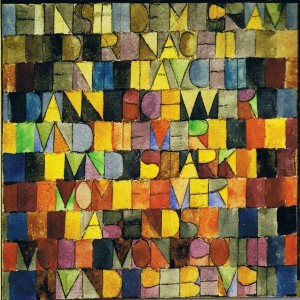You have no items in your cart. Want to get some nice things?
Go shopping Peter Lewis shares some of the pleasures and pitfalls of translating from German, from imponderable subclauses and outlandish compound nouns to the translator’s bête noire, the innuendo.
Peter Lewis shares some of the pleasures and pitfalls of translating from German, from imponderable subclauses and outlandish compound nouns to the translator’s bête noire, the innuendo.
Every time I embark on a new translating adventure, I’m mindful of a famous dictum by Robert Frost, alerting me to the duty of care I owe to the creator of the original. “Poetry,” said the American writer, “is what gets lost in translation.”
At root, Frost was right, of course: nothing can ever replicate the music of the primary text. Yet if we take “poetry” in its widest sense, to mean not just “verse” but the rhythm and elegance of a piece of writing, his words may at least serve as a salutary reminder to us translators that our task must always be to try and capture as much as we can of its essential character.
All in a Good Subclause
I’ve worked on a wide variety of texts over the years, and each different genre poses its own particular challenges. For example, I’m currently translating a major work on mediaeval European culture and history by an eminent German historian. Aside from the occasional problems I encounter with specialized terminology (regular liaison with the author helps me overcome these), the greater difficulty is to express the often complex ideas under discussion and maintain the rhetorical flow without letting the English grow stilted or opaque.
There’s a syntactical rigour to academic German that brings the language’s Latinate origins to the fore, as it meticulously assembles subclause after subclause and holds off unveiling the main verb until very late in the day. The writings of Immanuel Kant are the most extreme instance of this; at university in Freiburg, a German friend reading philosophy told me that he and his fellow students used to refer to an English translation of the Critique of Pure Reason in order to “unpack” the writer’s notoriously convoluted paragraphs and make sense of them. Mercifully, my author’s style is not remotely as rebarbative as Kant’s, but I’ll still sometimes find myself breaking up a single sentence into two, or even three, to better convey the meaning.

Grappling With Grammatical Monsters
Turning to the nuts and bolts of grammar, there’s a peculiar feature of German that has become something of an amusing cliché to English readers – its propensity for the compound noun. In fact, a forthcoming title by the excellent Ben Schott, called Schottenfreude: German Words for the Human Condition, will showcase some of the more outlandish of these terms. This aspect of the language, yoking together different components into one large, unwieldy unit, is much beloved of bureaucrats; legal German abounds in such compounds. Translating strategies vary where these monsters are concerned. Sometimes, it’s permissible just to use an abbreviation – thus, ‘Mehrwertsteuer’ (literally ‘excessive value tax’) can simply be rendered as ‘VAT’. German itself, indeed, frequently uses this ploy, but it can have the unfortunate side-effect of generating a slew of acronyms even more baffling to the non-native reader, who won’t necessarily even recognize what they stand for.
But on other occasions – and this is a good general tip – it’s worth bearing in mind that German is much more nominal in its mode of expression than English (British English, anyway). So, to avoid some horrific motorway-pile-up of nouns that sounds like Pentagon-speak, a translator would be well advised to recast the compound as a verbal phrase. To cite a random example, a note commonly seen pinned to student-union notice boards offering a quid-pro-quo deal of car travel in exchange for petrol money, ‘Mitfahrgelegenheit nach…’ (lit: ‘ride-with-opportunity to…’), would ideally emerge as ‘Anyone want a lift to…?’
As a postscript to this subject, it should not be forgotten that German compound nouns also harbour great creative potential, enabling writers to craft completely new terms. The winner of the 2009 Nobel Prize for Literature, Herta Müller, is a case in point. Her novel of that same year, which fictionalizes the harrowing incarceration in a Soviet forced-labour camp of her fellow German-Romanian writer, the poet Oskar Pastior, is hallmarked by its dense, highly allusive language: even its compound-noun title Atemschaukel (‘Breath-swing’) is invented.
Müller is fond of such neologisms; an earlier novel of hers is entitled Herztier (‘Heart-beast’). The respective translators of these works, Philip Boehm and Michael Hoffmann, wisely elected not to tackle these titles head-on, opting instead for ‘The Hunger Angel’, and ‘The Land of Green Plums’. I am full of admiration for these translators who (along with the late doyen of German poetry translators, Michael Hamburger, before them) are able to inhabit the alien linguistic landscapes of, say, Müller, Kafka, Celan, and Enzensberger and transpose them with signal success into another language.
 Roman Elegy
Roman Elegy
By comparison, my first foray into literary translation, Roman Elegy (Haus Publishing, 2013) has been plain sailing. The original novel, Stillbach by Sabine Gruber (C.H. Beck Verlag, Munich, 2011) is a superbly modulated piece of prose which blends fiction with real historical event. Embedded within a framework narrative set in 2009, the core of Gruber’s book comprises the interlinked stories of two women, Emma and Ines, both German-speaking Italians from the fictional South Tyrolean village of the title (a speaking-name – “quiet brook” – which would have been lost on English readers). At different times, the women come to work in Rome as chambermaids and end up spending their entire lives there. The two eras covered by the heart of the novel are the Fascist period (including, after the fall of Mussolini’s regime, the German occupation of Rome) and the so-called Anni di Piombo (“Years of Lead”), the long phase of political unrest that culminated in 1978 in the death of Pope Paul VI and the kidnap and assassination of former prime minister Aldo Moro.
The sheer storytelling drive of Stillbach and the clarity of the author’s language made it relatively straightforward for me to translate its narrative passages. But I still had to be alive to linguistic anachronisms: a perspicacious proofreader who kindly reviewed my draft translation rightly pointed out that my rendition of a pejorative German phrase for a good-time girl as “some dippy bimbo” just didn’t ring true for the late 1970s; I changed it to “some scatterbrained bed-hopper”. Incidentally, given the novel’s Roman setting, my rudimentary Italian was put to the test as well; just before the book went to press, I fortunately realized that “Triestina” was not a proper name at all, but meant “the woman from Trieste”.
Dialogue
But where I was really out of my comfort-zone, not having dealt with fiction before, was in the dialogue. Getting each character to talk naturally did not come easily, at least at first. I found the most effective way of road-testing what I had written was to read the exchanges aloud to myself and listen for whether any of the interjections or the rhythm of the characters’ speech jarred. I also learnt to ring the changes on such formulae as “he said”, “she replied”, “he responded”, “she answered”, etc., but not so insistently as to make it seem as though I’d swallowed a thesaurus.
Lost in Translation
And finally to the bêtes noires of the translator: idioms, puns, and slang. There were only a handful of these in Stillbach/Roman Elegy, but even so some had to be dropped as they were untranslatable. One extended anecdote, however, called for a little more ingenuity on my part. It concerned a servant colleague of Emma’s in 1930s Rome who skivvied in the kitchens of the German Embassy. For a banquet there in honour of Mussolini, a dish involving dozens of boiled eggs had to be made especially for the Duce. The servant woman was set to work preparing the eggs, but finding that one or two had tougher shells than the rest, resorted to cracking them open with her teeth. She subsequently retells this story in mixed company, and a German soldier who overhears it calls out ‘What’s that? You had the Duce’s eggs in your mouth?’, which provokes a chorus of ribald laughter from his comrades. The double-entendre turns on the fact that in German, “eggs” (Eier) is a slang expression for the testicles. Clearly, this doesn’t work in English. Then again, I could hardly leave out such a long passage, so what was I to do? The answer I came up with was to substitute walnuts for eggs, and at the point where the soldier’s risqué comment occurred, simply say ‘the Duce’s nuts’. My translator’s pride was thereby upheld, and the off-colour joke preserved. Job done…Phew!
Read our review of Sabine Gruber’s Roman Elegy.

About Peter Lewis
Peter Lewis read German at St. Edmund Hall, Oxford and Albert-Ludwigs-Universität, Freiburg before taking his doctorate and teaching at St. Anne’s College, Oxford. He still lives in Oxford, where he works as a freelance editor, translator, writer, and publishing project manager.





The art of the translator: the pleasures and pitfalls of translating from German, by Peter Lewis, via @LitroMagazine: https://t.co/suz0dx9ddx
Peter Lewis’s The Art of the Translator https://t.co/muRlVZRRkH
The Art of the Translator: https://t.co/4vk7uL7VxO
German translator Peter Lewis on grammar, dialogue, puns, and slang. https://t.co/irkDorUYJn